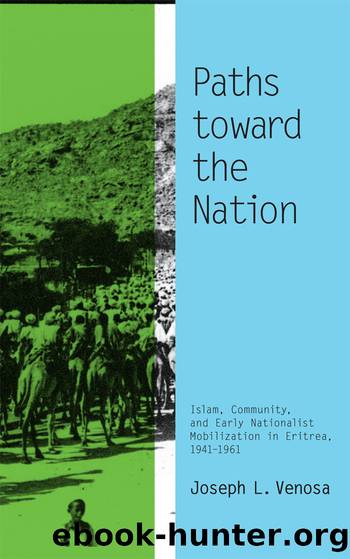Paths toward the Nation by Joseph L. Venosa

Author:Joseph L. Venosa [Venosa, Joseph L.]
Language: eng
Format: epub
Tags: History, Africa, General, Political Science, Political Ideologies, Nationalism & Patriotism, Colonialism & Post-Colonialism
ISBN: 9780896802896
Google: ptKxngEACAAJ
Publisher: Ohio University Press
Published: 2014-01-15T02:44:06+00:00
Muslim Responses to Resolution 390-A
For league officials and the broader nationalist constituency within the Independence Bloc, news of the UNâs decision did not immediately discourage their hopes that the basic objectives of independence were still attainable by the new proposed federal system. In light of the alternatives of partition or full-scale incorporation with Ethiopia, league leaders appeared ready to embrace the federation in spite of its shortcomings. By early December league officials began to publicly embrace the UN decision and did their best to frame the resolution in positive terms:
The United Nationsâ decision and its declaration concur with the rights and capacity of [the people of Eritreaâs] governance and administration of their own country. As a result of such a decision and declaration, the fear and terror of âpartitionâ that was posing a threat to all Eritrean people and the country, which the Independence Bloc strongly fought against, and sacrificed many lives and properties, has completely disappeared!
⦠based on the United Nations resolution and declaration, we know that we did not receive the complete independence of Eritrea that we asked for. However, we believe that we have the right to claim that the victory of the people of Eritrea is our victory, as we were the ones who were able to avoid partition and brought blessings to the people of Eritrea to govern their own the land.2
Other reactions were nothing short of jubilant. One bloc supporter, Degiat Sebhatu Yohannes, claimed that the general population received the UN decision with âoverwhelming happinessâ because people were finally relieved that the long-awaited decision promised to bring both âsuccess and freedomâ to all Eritreans.3 Such commentaries support the idea that for the Independence Bloc (and consequently the Muslim League), true victory had meant âthe non-partition of Eritrea, not the federation and its rights that came with it.â4 Nevertheless, the sudden about-face in both the league and the Independence Blocâs rhetoric regarding the merits of an autonomous federal system ran counter to the ideas that representatives had espoused only weeks earlier. In his final appearance before the UN committee, on November 24, Ibrahim Sultan had laid out the blocâs firm opposition to the very idea of a federation government, stating that representatives refused to accept such an âambiguous schemeâ on any level.5 He added that âa federal union, as we understand it, can only arise willingly between two independent states of equal sovereign rights, and not between an independent state and one which is being denied independence.â6 Largely because of the leagueâs recalcitrance in even considering the possible merits of a federal system, the tone in most of Sawt al-rabitaâs commentaries throughout late 1950 and early 1951 suggests that the leagueâs leadership struggled, at least initially, to find a way to articulate a response that could acknowledge the decisionâs shortcomings but also to encourage its members to look to the future.
Having mobilized an extensive network of branches and affiliated members of the Youth Association throughout the country, the initial responses to the decision did little
Download
This site does not store any files on its server. We only index and link to content provided by other sites. Please contact the content providers to delete copyright contents if any and email us, we'll remove relevant links or contents immediately.
| Hadith | History |
| Law | Mecca |
| Muhammed | Quran |
| Rituals & Practice | Shi'ism |
| Sufism | Sunnism |
| Theology | Women in Islam |
The History of Jihad: From Muhammad to ISIS by Spencer Robert(2628)
Nine Parts of Desire by Geraldine Brooks(2368)
The Turkish Psychedelic Explosion by Daniel Spicer(2356)
The First Muslim The Story of Muhammad by Lesley Hazleton(2271)
The Essential Rumi by Coleman Barks(2045)
1453 by Roger Crowley(2030)
The Last Mughal by William Dalrymple(1857)
Trickster Travels: A Sixteenth-Century Muslim Between Worlds by Davis Natalie Zemon(1847)
Muhammad: His Life Based on the Earliest Sources by Martin Lings(1646)
God by Aslan Reza(1641)
by Christianity & Islam(1632)
A Concise History of Sunnis and Shi'is by John McHugo(1567)
No God But God by Reza Aslan(1545)
Magic and Divination in Early Islam by Emilie Savage-Smith;(1534)
The Flight of the Intellectuals by Berman Paul(1503)
Nothing to Envy by Barbara Demick(1450)
Art of Betrayal by Gordon Corera(1430)
What the Qur'an Meant by Garry Wills(1394)
Getting Jesus Right: How Muslims Get Jesus and Islam Wrong by James A Beverley & Craig A Evans(1342)
